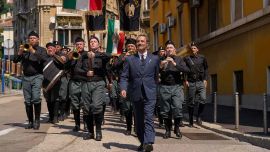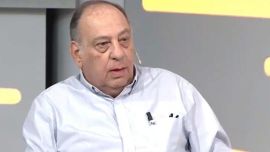Mutual Assured Destruction, or MAD for short, helped prevent the cold war from getting hot because both sides assumed the other really meant it; you nuke New York and we’ll turn Moscow into a sea of glass. But since then things have grown more complicated. How should Western countries react if Vladimir Putin uses “tactical” nuclear weapons against Ukraine? Would they seek to destroy the sites from which they were launched or merely retaliate with strong words, telling him he had crossed yet another red line and should be ashamed of himself?
After Putin in effect threatened to go nuclear, Joe Biden breathed fire back at him, but he refrained from saying exactly what the United States would do apart from calling more emergency summits and accusing him of threatening world peace. While strategic ambiguity, if that is what it was, may have its merits, it is unlikely to impress Putin or convince hesitant Europeans that it would be dangerous to try and force Volodymyr Zelensky’s government to let him have bits of Ukraine so he could claim a victory of sorts.
By now, Putin must know that his “special military operation” has been a humiliating failure and that prolonging it would be almost certain to make things even worse for him than they already are. In the eyes of the Ukrainians, Westerners and an increasing number of Russians, his armed forces are a vicious rabble whose members vent their fury on helpless civilians but turn tail when approached by enemy soldiers carrying up-to-date weapons. What is more, according to reports from the front, morale is so low that at any moment thousands of soldiers who fear getting trapped could surrender and plead to be treated in accordance with the Geneva Convention.
The partial mobilisation just ordered by Putin is unlikely to help much; training or retraining those drafted will take several months. By the time they are ready for combat, the war could be over and Putin out. He may be defiant but he is clearly feeling the pressure.
The decision to issue a mobilisation order cannot have been taken lightly. For evident reasons, the Russian regime has preferred to rely on people from remote regions and ethnic minorities rather than young men from Moscow and St Petersburg who have little desire to do their patriotic duty by dying or losing limbs in Putin’s war. Like those youthful North Americans whose opposition to the Vietnam war all those years ago was intensified by their understandable fear of being sent away to fight it, their Russian counterparts have been staging street protests. One big difference between then and now is that while the Vietnamese Communists were as bad as they were painted by US officials and proved it as soon as they were in power, the Ukrainians have nothing at all in common with the genocidal Nazi thugs Putin goes on about.
Putin once said that the collapse of the Soviet Union was “the greatest geopolitical catastrophe of the 20th century.” Perhaps it was, from a Russian nationalist’s perspective, though from theirs, many Germans and Japanese, whose forebears’ recklessness had devastating and long-lasting consequences for their respective countries, would probably disagree. However, luckily for them and their neighbours, after suffering defeat in World War II neither fell into the hands of individuals determined to rewind history and restore the power that had been lost. This is what Putin is trying to do, but the way things are going, he could well end up bringing about what, if he survives, he could call the greatest geopolitical catastrophe of the 21st century: the break-up of the Russian Federation and a big increase in the power of China.
Barely half a year has gone by since Alberto Fernández told Putin he wanted Argentina to serve as Russia’s doorway into Latin America. It would appear that nobody had told him Russia was about to invade Ukraine or, if someone did mention it, he had assumed that the “special military operation” would be over after a couple of days, leaving Putin, his prestige enhanced, willing enough to invest huge amounts of money in a friendly South American country.
When the Soviet Union still existed, it was widely assumed to be far richer than it really was; in most year-books published by respected newspapers and allegedly insightful organisations such as the CIA before it disintegrated, the Soviet economy was ranked second after that of the United States. Russia has also benefited, if that is the word, from a widespread willingness to take an exaggerated view of her accomplishments so, despite having an economy which is about the size of Italy’s, until very recently it was generally assumed that she had enough money to make her armed forces the second-most powerful in the world and, given her rulers’ lack of concern for the fate of civilians, in all likelihood by far the most lethal.
Did Putin believe his own propaganda, or was he bluffing when telling the Ukrainians it would be suicidal as well as stupid for them to resist being liberated from their “Nazi” overlords? This is a question that still puzzles people who have spent years studying his behaviour. As an experienced intelligence operative, Putin must surely have been aware that the Russian military was extremely corrupt; apparently, he welcomed this because it made it easier for him to manipulate the top brass but overlooked the disadvantages which include a tendency to buy defective equipment.
Equally surprising has been Putin’s failure to take into account the demographic changes which have been taking place while he has been in power. One reason Soviet losses in World War II were so phenomenally high was the willingness of Stalin to sacrifice those under his command. After all, the Russian and their subject peoples had plenty of offspring that could be shovelled into the meat-grinder. This is no longer the case. For years, Russia’s demographic profile has been even worse than that of most Western countries. So too is Ukraine’s, but it would appear that she still has enough young people to see off the Russian invaders, an achievement which, strange as it may seem, could do wonders for the birth rate.























Comments